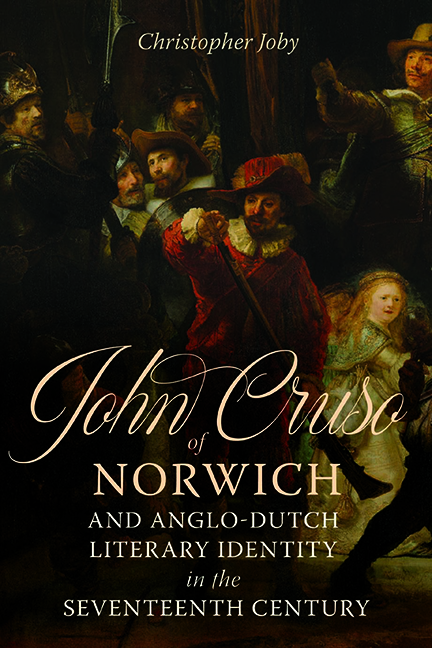Book contents
- Frontmatter
- Dedication
- Contents
- List of illustrations
- Acknowledgements
- Author’s note
- Abbreviations
- Prologue
- 1 Intrat John Cruso
- 2 John Cruso’s school days
- 3 John Cruso’s early adult life
- 4 Cruso’s elegy to Simeon Ruytinck (1622)
- 5 Cruso the English poet
- 6 1632 – Cruso’s annus mirabilis
- 7 Cruso the translator
- 8 Cruso’s 1642 Dutch verses: praise and lamentation
- 9 Cruso and the English Civil Wars
- 10 Cruso the Epigrammatist
- 11 Cruso’s final years
- Epilogue
- Appendix 1 Poems by John Cruso
- Appendix 2 Liminary verses in John Cruso’s English publications
- Bibliography
- Index
- Studies in Renaissance Literature
10 - Cruso the Epigrammatist
Published online by Cambridge University Press: 26 May 2022
- Frontmatter
- Dedication
- Contents
- List of illustrations
- Acknowledgements
- Author’s note
- Abbreviations
- Prologue
- 1 Intrat John Cruso
- 2 John Cruso’s school days
- 3 John Cruso’s early adult life
- 4 Cruso’s elegy to Simeon Ruytinck (1622)
- 5 Cruso the English poet
- 6 1632 – Cruso’s annus mirabilis
- 7 Cruso the translator
- 8 Cruso’s 1642 Dutch verses: praise and lamentation
- 9 Cruso and the English Civil Wars
- 10 Cruso the Epigrammatist
- 11 Cruso’s final years
- Epilogue
- Appendix 1 Poems by John Cruso
- Appendix 2 Liminary verses in John Cruso’s English publications
- Bibliography
- Index
- Studies in Renaissance Literature
Summary
‘Non intret Cato theatrum meum: aut si intraverit, spectet’ [Do not let Cato enter my theatre: or if he does enter, let him look]. With these words of the Roman poet, Martial, Cruso announced in 1655 a radical change of tack in his work as a Dutch poet. Up to this point his published Dutch oeuvre consisted of three verses, two elegies, and one amplificatio on Psalm 8, which were of a piece with his public role as a Dutch church elder. However, in 1655 the Delft poet-printer Arnold Bon published 221 of Cruso's epigrams in quarto, many of which were scabrous and presented a side of Cruso's character quite different from the pietas of his earlier Dutch verses. This chapter analyzes these epigrams, which constitute the final episode of Cruso's work as a Dutch poet and indeed as an author.
The analysis begins with the title page and first three epigrams, which in some sense serve as liminary poems, taking the reader across the threshold from the title page to the other 218 epigrams. Not for the first time, Cruso partially obscures his authorship with his onymat cryptique, I.C. However, epigrams to Johannes Elison and Jonas Proost as well as one that references Norwich tell us that the only possible author of the collection was John Cruso. The short form of the epigram allowed Cruso to experiment with metre, and he employs several Renaissance metres including the alexandrine in the collection.
Many of Cruso's epigrams are based on classical and Neo-Latin models, so it will be instructive to analyze which authors wrote the hypotexts, to use a term coined by Gerard Genette, and what the intertextual relationship is between Cruso's epigrams and the verses on which he modelled them. Taking his lead from the Roman poet, Horace, Cruso's contemporary Ben Jonson saw the role of the poet as not to ‘imitate servilely, as Horace saith’, but to draw from the ‘best and choicest’ of the verse of other authors and turn them into sweet honey. Cruso was one poet who attempted to follow this advice. He did so by using a range of rhetorical transformations, such as imitatio and variatio, to construct his epigrams, and indeed construct the poetic voice with which he speaks in this collection.
- Type
- Chapter
- Information
- Publisher: Boydell & BrewerPrint publication year: 2022



